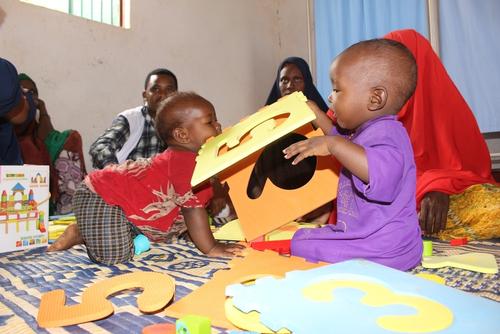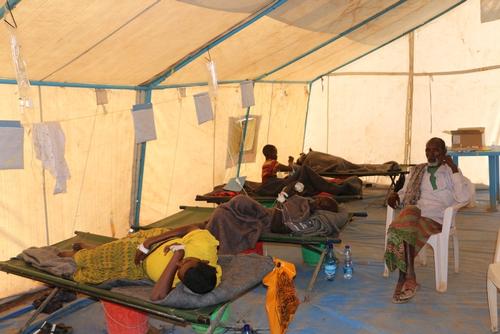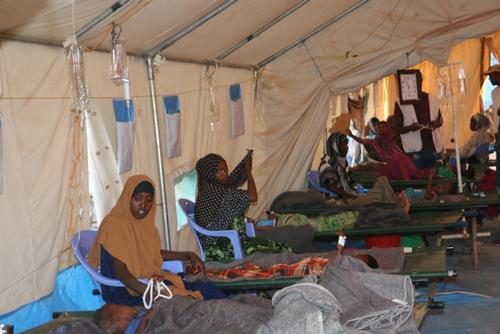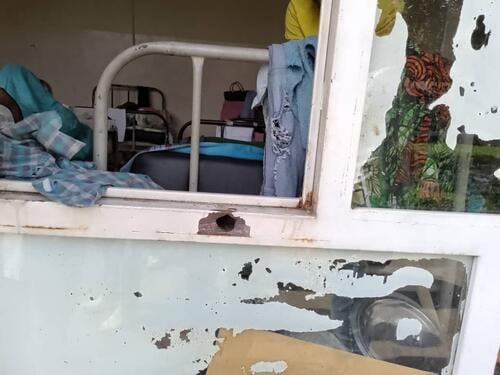- Continuing drought and endless fighting has made life unbearable for many people in Somalia.
- For those within reach, the Ethiopian border town of Dolo Ado offers safety, food and the healthcare they lack at home.
- Médecins Sans Frontières (MSF) operates a clinic in Dolo providing healthcare for those escaping the chaos as well as the local community.

Despite the tears streaming down the face of his young child as he is being vaccinated by the MSF nurse, Mohamed Shiniyey Mussa has a wide smile. Along with his wife and 10 children, he has just completed the difficult journey from their village of Kormay in Somalia and is now sitting in the refugee reception centre in Dolo, a small Ethiopian border town. This is the primary point of entry for Somali refugees fleeing the drought and civil war back home.
“We were forced to make this journey,” explains Mohamed. “There hasn’t been much rain in our region in recent years and we can only grow a little food on our farm. It’s just not enough for the whole family. Things are made worse by the armed men of al-Shabaab, who often come to our homesteads and steal our food and money.”
Other families who have also come across the border tell similar stories. The militant group al-Shabaab, which has been fighting the government for the last decade, partially controls the three drought-stricken regions, Gedol, Bakol and Bay in the east of the country. The fighting has stopped food aid entering the region making fear and starvation weapons of war.
“Many have seen their relatives killed for collaborating with ‘government forces’. This can be for something as small as offering water to some soldiers or trying to stop the theft of some of their crops,” says Mohamed. “Those who go in search of food in neighbouring regions are forced back at gunpoint and told to wait. According to the wisdom of the local al-Shabaab leaders, rain will come only if God wills it. If the rain doesn’t fall, then all will have to live with the consequences.”
For those who reach the border town of Dolo, it is a last hope. Security, medical care and food can all be found here, all of which are in short supply in Somalia. But this journey comes at a price. By car, a two-day drive can cost over 2,000 Ethiopian Bihr (US$50). For those who can’t afford this, the only other option is to walk. The youngest and oldest suffer the most in this harsh climate and many arrive malnourished.
The five refugee camps outside Dolo Ado have become a sanctuary for Somalis fleeing the violence in their homeland. On the Ethiopian side of border, there have been no significant armed attacks in years. However, people remain vigilant as they have heard of armed attacks on the Kenyan side of the border which have cost many lives.
Dolo is especially important given that there are few health facilities within 150 kilometres on the Somali side of the border. In addition to the new arrivals in the reception centre, over the last 10 years, up to 240,000 refugees have settled in one of the five camps in Dolo.
MSF has two health posts in the camps and runs a health centre in Dolo town. It is also active in the refugee reception centre where the condition of new arrivals is assessed and the Ethiopian authorities decide who can stay and who must go back to Somalia.
According to Chris Eweillar, MSF’s operations manager in Dolo, “while many of the refugees will remain permanently in the camp, many others will travel back across the border when the drought and security situation calm down. Very often, women come across with their children to the other side of the border while their husbands stay and look after their homesteads. When things improve, word will be sent to the camp that the family should return.”
The MSF-supported health clinic in Dolo is vital to the refugees and the local community. Some of those travelling from across the border arrive tired, demoralised and depressed. Kadar Muktar Moali, MSF’s mental health officer, explains, “We take special care of the children as they can be suffering from severe anxiety, not only caused by the experience back at home but also by the arrival in this new environment.”
“You must realise that MSF in Dolo is really part of the community,” says chris Eweillar. “Most of our health workers are from the region. They are not only competent in their field of medicine but also speak the local language and really understand the culture.”
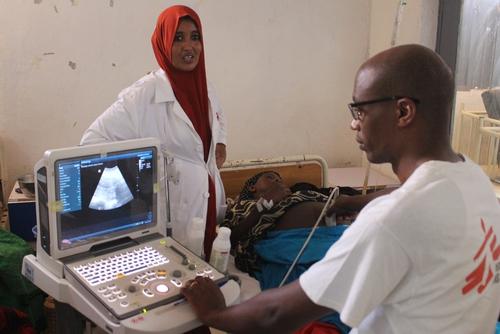
However, many are concerned about the future. With the threat of closure of the Dadaab, the refugee camp located in Kenya which has hosted Somalis for decades, Dolo may prove to be the only alternative for asylum.
There is also a fear that this year’s elections in Somalia will stir up more violence as al-Shabaab have promised to stop them by any means. The equation is simple: increased violence and continued drought mean more people are taking the risk of leaving the instability.
In Dolo, relations between the refugees and the locals are good. While Ethiopian, the local people are also of Somali heritage and share the same traditions as the new arrivals. Community elders do much to ensure that bonds remain strong. Many local people realise that they, too, have benefited from the free health services that the government and international NGOs have brought to the area because of the refugees.



